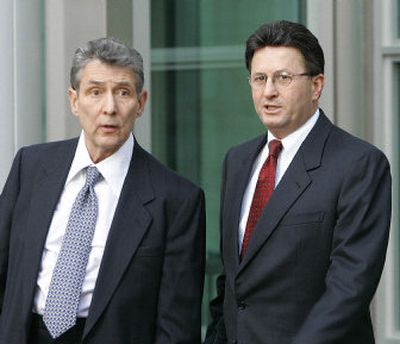Grand jury indicts past Qwest CEO

DENVER – A federal grand jury indicted former Qwest Communications Chief Executive Joseph Nacchio Tuesday on 42 counts of insider trading accusing him of illegally selling $101 million in company shares after privately learning that Qwest might not meet its financial goals.
Nacchio, 56, appeared in court a few hours after the indictment was announced and pleaded not guilty before being led away in handcuffs. Freed a short time later on a $2 million bond, he told reporters he was relieved to finally see the case against him.
“It’s pretty tough for four years to have to sit back and let everybody take shots at you,” he said outside the federal courthouse. The criminal charges are the first against Nacchio in the government’s lengthy investigation of Qwest Communications International Inc., the telephone service provider for 14 mostly Western states that only now is recovering from a multibillion-dollar accounting scandal.
The charges come nearly three years after then-Attorney General John Ashcroft announced the first indictments in the Qwest investigation, calling it an example of the government’s intolerance of white-collar crime. With Nacchio’s indictment, U.S. Attorney William Leone said, that investigation is virtually complete.
U.S. Magistrate Patricia Coan said Nacchio could be released on $2 million bond. Prosecutors did not seek to have him detained, though Nacchio was ordered to surrender his passport as a condition of his release.
Each count carries a penalty of up to 10 years in prison and a $1 million fine. Nacchio also faces fraud charges filed by the Securities and Exchange Commission and a number of shareholder lawsuits.
The indictment accuses Nacchio of selling $101 million worth of company stock in the first five months of 2001 when he allegedly had insider information. The sales took place in 42 transactions ranging from $191,000 to $13.6 million each.
The indictment blames Nacchio for “a manipulative and deceptive” scheme to commit fraud and says he was “specifically and repeatedly warned” about the financial risks facing his company just five months before the stock trades in question. Prosecutors refused to discuss who allegedly warned Nacchio about revenue problems at Qwest or who might testify at trial.
The government has said in civil and criminal complaints that Qwest and some former executives participated in a massive financial fraud between April 1999 and March 2002 by falsely reporting one-time sales or trades of capacity on its fiber-optic cables as recurring revenue.
The fraud allowed Qwest to improperly book approximately $3 billion in revenue that eased its 2000 merger with U S West Inc. and it allowed various executives to reap millions in “ill-gotten” profits, the government has said. Qwest later restated earnings from 2000 and 2001 to erase about $2.2 billion in revenue.
The indictment said Nacchio was aware of Qwest’s “extremely aggressive” financial targets and that to meet those targets in 2001 the company would have to significantly boost its flagging “recurring revenue business.” It said he also knew there wouldn’t be enough revenue from other sources to “close the gap” between Qwest’s publicly stated goals and its performance.
Nacchio has denied any wrongdoing, telling members of Congress in 2002 that he made stock sales believing the company’s financial statements always represented “a full and accurate picture of its financial condition.”